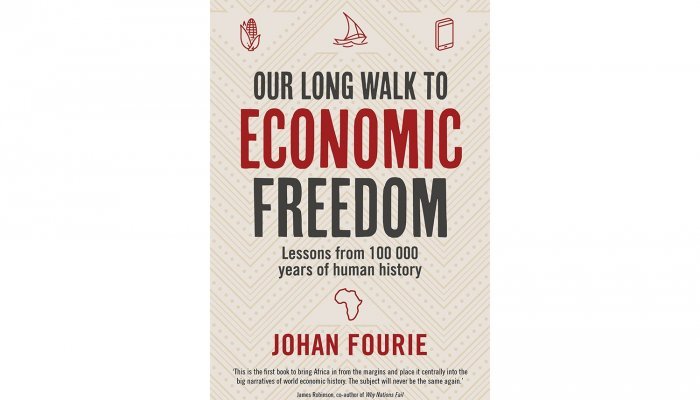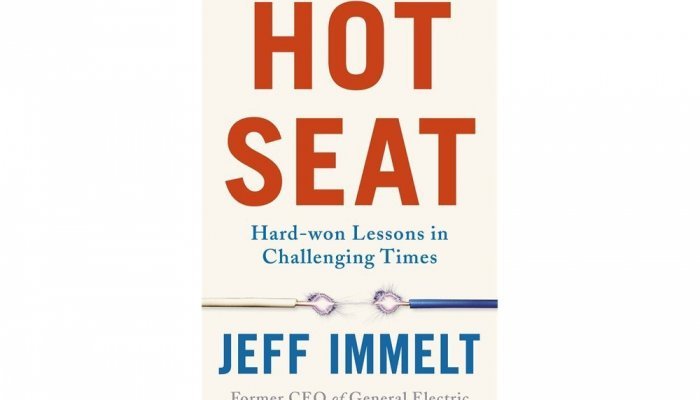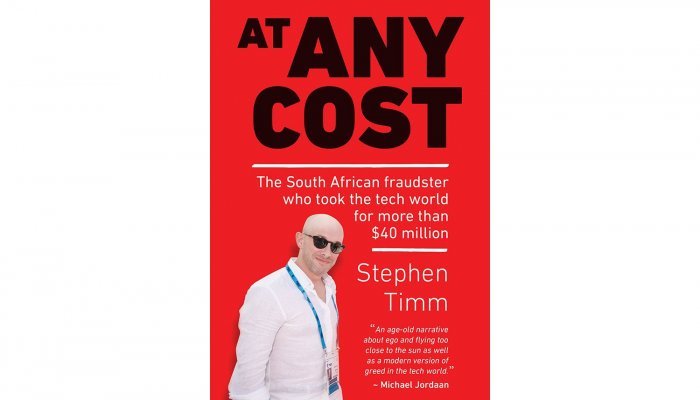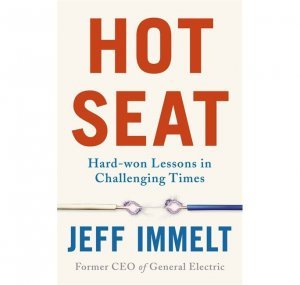
Hot Seat
Hard-won Lessons in Challenging Times
Jeff Immelt
Hodder & Stoughton – R355
It has the plot of a novel: dramatic corporate succession battles, an international terrorist attack, a global financial crisis, acquisitions and divestitures, treachery in the boardroom, overweening ambition and a hero who becomes a villain – or does he?
In fact, it is a true story written by that hero, Jeff Immelt, who, for 16 years, was CEO of one of the world’s biggest and most influential companies – General Electric.
The transition from Jack Welch to Immelt as CEO was one of the most public, prolonged and closely watched successions in corporate history. To begin with, Welch himself was the original ‘rock star’ CEO. He had taken GE into the stratosphere, accompanied by a tidal wave of adulatory books and articles.
Imagine, then, the fuss when this nonpareil announced not only that he would be retiring soon, but that his successor would be chosen from three very senior and accomplished GE executives after long and arduous scrutiny. The losers would immediately depart, cast out like the vanquished in a medieval trial by combat. Immelt was the winner, but even Welch’s most ardent admirers swallowed hard when he delayed his departure for nearly a year, apparently to ensure that everything really did go to plan.
Already on a hiding to nothing, Immelt finally took over from Welch on 10 September 2001. The following day, terrorists flew hijacked airliners into New York’s World Trade Center and the Pentagon in Washington. Markets slumped, with airlines and insurance companies worst hit. GE was one of the world’s biggest manufacturers of engines for jet aircraft and had significant investments in insurance. Little did Immelt know, but 9/11 would not be his biggest problem.
That lay seven years in the future, and we know it today as the Great Recession, but the seeds of GE’s near-demise then had been put in place years before by the legendary Jack Welch himself.
As he built GE from a $25 billion manufacturing company to a $130 billion conglomerate, part of Welch's genius was to finance his customers’ purchases. Need a couple of new power stations? Sure, here’s the money. Three or four dozen of those jet engines? Please, allow us to help. With a triple-A credit rating, GE could borrow cheap and lend to customers at better rates than they could get from their banks. At the centre of this growth engine was a division called GE Capital. When Immelt took over from Welch, it was generating nearly 50% of GE’s overall profits. When Lehmann Brothers collapsed in 2008, GE Capital wobbled so badly that only a government guarantee and a $3 billion investment from Warren Buffet saved the company. Immelt had seen and understood the GE Capital problem but, by his own admission, had not moved quickly enough to downsize its role on the company’s balance sheet.
By 2017, it was Immelt’s turn to leave, which he did under extremely unpleasant conditions, driven by activist shareholder, Nelson Pelz. The business media had been on his case for a while, fed by Pelz’s team, although there is no denying that on Immelt’s watch, GE’s share price had declined dramatically, as had its dividend. Immelt has been cast as the villain of the piece, the man who, as one writer put it, ‘destroyed the house that Jack built’.
Four years later, he tells his side of the story. Hot Seat is lucid, highly compelling reading, especially as we travel through the various crises which beset Immelt and the company. It is also, in my opinion, a very balanced account of the impact of those crises on GE. Tough on some of those around him, Immelt is even tougher on himself and freely admits that there are things he could and should have done better. For more on Immelt and Hot Seat, please see my interview with him on page XX.
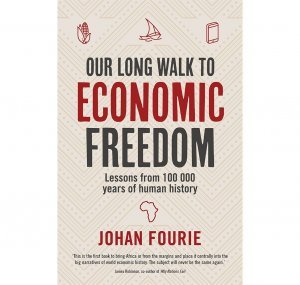
Our Long Walk to Economic Freedom
Lessons from 100 000 years of human history
Johan Fourie
Tafelberg – R310
At the heart of Johan Fourie’s new book lies a series of central questions: Why is Africa such an economic disaster area? Was it pre-destined that this should be the case, perhaps through some fluke of geography? Or was it the fault of colonialism and, in South Africa’s case, the racists who implemented apartheid? Whatever the cause, what would we as Africans and South Africans need to do to turn this around, assuming that this is even possible?
There is no need for a spoiler alert if I reveal that Fourie certainly does think a turnaround is possible. To arrive at this conclusion, he takes us on a series of unexpected journeys, at least from a professor of economics at Stellenbosch University.
The book has 34 chapters, and each one is a mini-story on its own, reaching into economic history to make a point. For example, one is headed ‘Why do Indians have dowry and Africans lobola?’, exploring precolonial African economic systems. Another chapter, ‘How could a movie embarrass Stalin?’, deals with Russia and the turn to communism. If you should read the book, don’t be tempted to skip the introduction. ‘How do we thrive?’ is its title and deals with the vital concept of how prosperity is created.
Piece by piece, chapter by chapter, Fourie assembles what is, loosely speaking, an economic history of the world, with Africa firmly at its centre. As the chapters link up, he draws the reader slowly towards present-day Africa and lays out the policy choices which confront us.
Don’t be alarmed – this is not a dense, jargon-clouded economic textbook. Fourie deliberately targets the non-specialist, and his style is clear, entertaining, and, as a result, all the more memorable. If you’re going to read just one economics book in your lifetime, it should be this one. You’ll certainly understand how we got here and what decisions we need to make about where we go next.
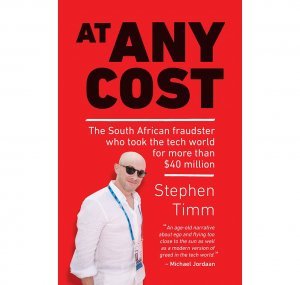
At Any Cost
Stephen Timm
Tafelberg – R310
It’s a tale as old as the hills. Normally, it involves a smooth-talking youngster making promises that sound very plausible, based on apparently excellent results, which are quite recent. At some point, a suggestion is made that you might like to invest, which you do. After all, others, sometimes much richer and more famous than you, have already done so, so what have you got to lose?
In the case of Durban-born scammer, Eran Eyal, the answer turns out to be quite a lot.
With a string of very dodgy companies behind him in South Africa, Eyal fetched up a few years ago in New York where he proceeded to set up a rival to Bitcoin called Shopin. Investors were brought on board, lured by tales of big-name backers, even bigger-name clients and Eyal’s own lifestyle, which could only have been funded by very real business success – couldn’t it?
As author Stephen Timm reveals in At Any Cost, it was a $40 million scam. Eyal was arrested in 2018 and charged with, and convicted of, fraud. Amazingly, and to the extreme dismay of his badly burned former investors and employees, despite the conviction, he was simply extradited to Israel in the middle of last year. As far as Timm knows, this is where he resides to this day.
Timm’s tale is remarkable in that Eyal is so ordinary, so incompetent, and so obviously a fraudster that the reader is left wondering how anyone fell for his schemes in the first place. There is a one-word answer: greed. It turns out that we all want so badly to be in on the next big thing, to invest in the next unicorn – a Tesla, or Google or Amazon – that we suspend all disbelief.
Did I say it’s a tale as old as the hills? Go as far back as you like in history, and there is always someone who promises that he really can turn lead into gold. And there is always someone else who believes and puts up the money – big money – for it to happen. No matter who tells the story, the ending is always the same.


